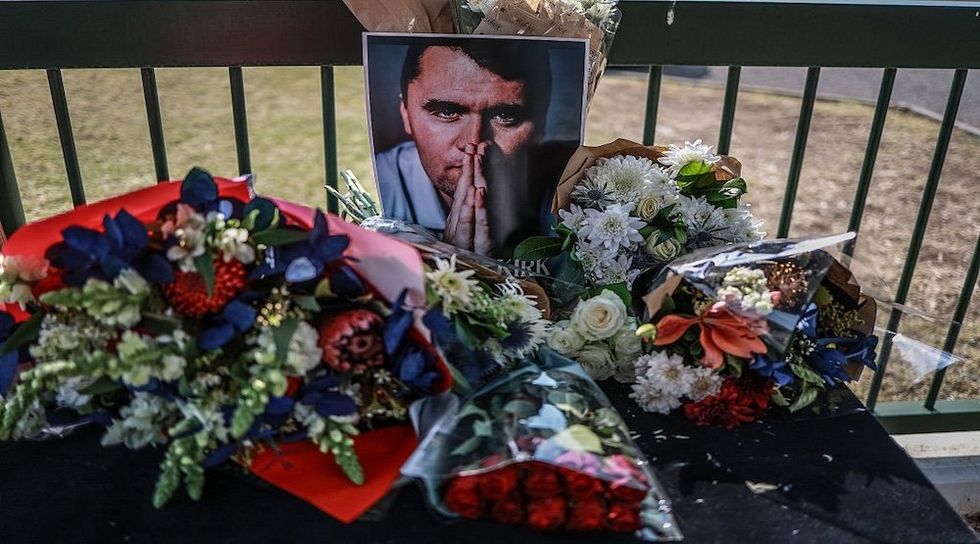
Photo by Trent Nelson/Salt Lake Tribune/Getty Images

Kirk’s assassination revealed what he long warned: When speech is cast as hate, a culture of violence follows. America can no longer ignore the danger.
“When people stop talking, really bad stuff starts.”
Just days after Charlie Kirk was assassinated, a clip of him saying these exact words went viral. In it, Charlie explained to the students around him the reason why he felt called to speak at college campuses across America — something he did for years with great success. “When you stop having a human connection with someone you disagree with, it becomes a lot easier to want to commit violence against that group,” Charlie explained.
Though many who had the privilege of debating Charlie would walk away with a newfound understanding and respect for the other side, just as many would leave in a frenzy, unable to reconcile their own convictions with the truth in his words. For them, it was easier to call him “hateful.”
Charlie’s assassination was the inevitable consequence of a subversive culture that taught Americans that words are violence, disagreement is hatred, and silencing your opposition, even permanently, is a moral good.
His life’s work was dedicated to countering a fundamental breakdown in civil discourse taking place within our country. Conversation itself had become “hate speech”; its proponents were labeled “fascists” — the solution for which was violence. This moral perversion, echoed from classrooms to the highest offices of power, built a culture of permission that ultimately led to Charlie’s assassination.
Though conventional responses often emphasize abstract calls for “unity,” such routine prescriptions miss the mark. This moment requires unrelenting confrontation. It demands that we renew our commitment to debate, possess the courage to repel assault on free speech, and above all, refuse to tolerate the moral perversion within our culture that rationalized, if not directly caused, Charlie’s death. If we fail to meet this moment of national crisis with conviction, nothing will change.
Just days after Charlie’s assassination, YouGov polling on political violence confirmed what disturbing public celebrations of his death had already revealed: Liberals are increasingly willing to justify political violence.
According to YouGov, “very liberal” Americans are eight times more likely to say political violence is justified than their conservative counterparts (25% versus 3%). When it came to celebrating the death of a public figure, 90% of “very conservative” people said it was not acceptable to be happy about the death of a public figure, compared to only 56% of the “very liberal.”
The bleak reality of this data played out in real time as college professors, Democrats, and elected officials celebrated, if not excused, Charlie Kirk’s assassination. Some members of Congress even felt the need to contextualize Charlie’s assassination with all the “bad things” he has said over the years — as if anything he said somehow made his life less valuable and more deserving of death.
On social media, these sentiments were sadly commonplace.
Charlie’s work on college campuses was dedicated precisely to this issue. For too long, the left has enjoyed an unchallenged echo chamber of subversive thought, inverting conventional American morals that value the pursuit of truth, free speech, and open debate with violence and suppression in the defense of ideological conformity — the ultimate good of the progressive left.
At San Francisco State University, for instance, former NCAA swimmer Riley Gaines was infamously assaulted and held for ransom by a mob of enraged students, simply for affirming the reality that men cannot be women.
At MIT, students and faculty alike demanded that the university cancel geophysicist Dorian Abbot’s lecture on climate change on the basis that Mr. Abbot did not support race-based admissions and instead believed that people should be evaluated as individuals — how horrible. “Freedom of speech goes very far, but it makes civility difficult,” said MIT Professor Robert van der Hilst.
Charlie’s warning was prophetic; people had indeed stopped talking, and bad stuff was happening. Any thought that challenged the progressive orthodoxy was not up for conversation, and, in fact, holding such controversial beliefs barred you from university grounds altogether.
Free speech makes you dangerous and violent. It made Charlie Kirk a threat.
In reality, the willful suppression of speech, debate, and the pursuit of truth is far more dangerous, subversive, and “hateful” than any charge Democrats have ever levied against us. Charlie’s death is proof of that.
RELATED: Charlie Kirk showed us the lie at the heart of progressive culture

His assassination was not an isolated crime. It was the inevitable consequence of a subversive culture that taught Americans that words are violence, disagreement is hatred, and silencing your opposition, even permanently, is a moral good.
So now is not a time for “both-sides-ism.” Our nation faces moral bankruptcy, and the radical left has made it clear where it stands. It is incumbent upon all of us to push harder, chastise evil, and especially challenge the institutions that reject the principles of free speech that Charlie fought so hard for. Failure to do so will only result in further deterioration of the shared values that we believe make our nation great.
Eric Burlison